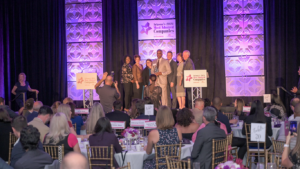Despite extensive data that shows women are graduating college at a higher rate than men, there’s still an underwhelming representation of women in science, technology, engineering and math (STEM) fields in the United States. According to the U.S. Economics & Statistics Administration, women hold less than 25 percent of STEM jobs, and this has held true for the past decade.

One of the primary causes for the lack of women in STEM fields is implicit bias that can be traced back to girls as young as age 6. A Princeton University study revealed children are quick to label their intellectual abilities, even in early childhood. The study results also indicated children associate qualities like brilliance and natural intelligence with men. This can cause girls to eliminate the possibility of a STEM career early on, even though there’s no hard evidence to suggest girls are worse at math or science than boys.
Because of this pervasive bias that can deter women from pursuing STEM careers, we need to be diligent about encouraging young girls to consider STEM as a viable and attractive career option. Thankfully, a plethora of incredible organizations in Arizona have emerged to combat this issue.
Girls in Tech, for example, is an international organization focused on the engagement, education and empowerment of women and girls in technology. A Phoenix chapter was relaunched in 2016 and is led by a group of remarkable women who are leaders in the local technology and business landscape. This organization’s members hold monthly coding boot camps for girls ages 10 to 16 in partnership with Microsoft, visit schools to speak to girls about careers in tech and provide opportunities for mentorship.
Paradise Valley Women in Technology is also leading efforts to encourage girls to consider careers in technology. This organization possesses a computer station to work with children on computational thinking and helps young girls understand what it means to be a woman in technology.
The Chief Science Officers program, a collaborative effort by the Arizona Commerce Authority and the Arizona Technology Council Foundation, is fast becoming one of the top programs in the nation dedicated to creating a pipeline of diverse STEM leaders. The program currently consists of more than 300 students—more than half of whom are girls. The program has been so successful that it has expanded to three additional states and two countries.
The Foundation also collaborates with numerous partners on a statewide Arizona SciTech Festival that can also introduce girls to STEM. Through a series of more than 2,000 expos, workshops, conversations, exhibitions and tours held in diverse neighborhoods throughout the state, the Arizona SciTech Festival excites and informs Arizonans from ages 3 to 103. The 2018 SciTech Festival saw more than 500,000 attendees throughout 80 Arizona cities and towns.
It’s also equally important to recognize the incredible female leaders who make up the Phoenix technology community. They include Calline Sanchez, vice president, IBM Enterprise Storage, and Leah Sweet, vice president of global design delivery and operations at PayPal. Both women also are influential members of the Council’s board of directors.
Other women leading the technology sector in Phoenix include Rebecca Clyde, co-founder of Botco.ai, Ideas Collide and the Phoenix chapter of Girls in Tech; Heidi Jannenga, co-founder and president of WebPT; Brenda Schmidt, founder and CEO of Solera Health; and Alexi Venneri, co-founder and CEO of Digital Air Strike.
Even though the STEM environment for women has improved in the last few years, it’s critical that we continue striving to foster equality and representation for women in STEM. By encouraging girls to consider STEM careers at an early age, we can instill a passion that will follow them through adulthood.
Steven G. Zylstra is president and CEO of the Arizona Technology Council.




